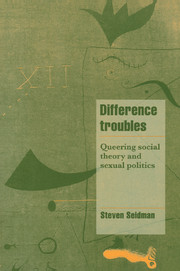Book contents
- Frontmatter
- Contents
- Preface
- Acknowledgements
- Introduction: the contemporary reconfiguring of social theory
- Part I Resisting difference: the malaise of the human sciences
- Part II Engaging difference: from lesbian and gay studies to queer theory
- Part III Democratic prospects: the politics of knowledge and identity
- 8 Transfiguring sexual identity: AIDS and the cultural politcs of sexuality and homosexuality, 1981–1986
- 9 From gay ethnicity to queer politics: the renewal of gay radicalism in the United States
- 10 Postmodern anxiety: the politics of epistemology
- 11 The politics of sexual difference in late twentieth-century America
- 12 Difference and democracy: group recognition and the political cultures of the US, Holland, and France
- Epilogue: pragmatism, difference and a culture of strong democracy
- Notes
- References
- Index
12 - Difference and democracy: group recognition and the political cultures of the US, Holland, and France
from Part III - Democratic prospects: the politics of knowledge and identity
Published online by Cambridge University Press: 05 October 2010
- Frontmatter
- Contents
- Preface
- Acknowledgements
- Introduction: the contemporary reconfiguring of social theory
- Part I Resisting difference: the malaise of the human sciences
- Part II Engaging difference: from lesbian and gay studies to queer theory
- Part III Democratic prospects: the politics of knowledge and identity
- 8 Transfiguring sexual identity: AIDS and the cultural politcs of sexuality and homosexuality, 1981–1986
- 9 From gay ethnicity to queer politics: the renewal of gay radicalism in the United States
- 10 Postmodern anxiety: the politics of epistemology
- 11 The politics of sexual difference in late twentieth-century America
- 12 Difference and democracy: group recognition and the political cultures of the US, Holland, and France
- Epilogue: pragmatism, difference and a culture of strong democracy
- Notes
- References
- Index
Summary
The question of how societies accommodate social differences is not of course a new issue. Nations composed of multiple cultural communities are not a recent development. However, in the past century or two, at least in Anglo-American nations and the countries of southern Europe, the politics of difference has often been associated with illiberal ideologies such as racism or anti-semitism. Fascism, for example, fashioned demonic images of a threatening “Other” which was invoked to mobilize this movement. The marking of difference as a social danger remains a pivotal strategy in right-wing movements in the West, only today it is less likely to be “the jew” or the communist than “the black” or “the homosexual” or “the muslim” that energizes a hateful politics.
As the social influence of the New Right in the US and England or the National Front in France indicates, a conservative politic anchored in images of a dangerous “Other” continues to be a force in the political landscape of Western nations. However, in the past two decades or so, movements and discourses have surfaced which couple a politics of difference to democratization. This new politics of difference aims to redefine the social meaning of public life and democracy. Moreover, whereas in the past liberalism made its case against a conservative politics of difference, today a democratic politics of difference is pressing its agenda against a now dominant liberal ideology that is often hostile to a politics that affirms a strong concept of democracy and pluralism.
- Type
- Chapter
- Information
- Difference TroublesQueering Social Theory and Sexual Politics, pp. 237 - 254Publisher: Cambridge University PressPrint publication year: 1997



